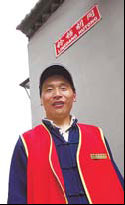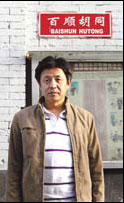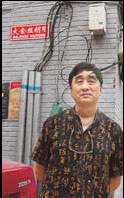
|
Residents at Yingtao Hutong, Xuanwu district, enjoy a leisurely moment.[Photos by Wang Jing / China Daily] |
Beijing's disappearing hutongs hold the key to the rich history and culture of the capital
Ji Wei, a 21-year-old sophomore at a university in Beijing, rediscovered his passion for hutongs during his visit to the Shanghai World Expo.
At the Beijing Pavilion, he was impressed by a wall decorated by nameplates of 150 of the city's hutongs.
The wall has become one of the most photographed areas of the pavilion, with many people posing beside the sign of their favorite hutong.
"It is not the modern skyscrapers that defines a city but its historical buildings," Ji said.
A Chinese surnamed Sun, who moved to Belgium two decades ago, was touched to see the name of the hutong where he lived as a child.
| ||||
"There are about 2,000 hutongs left in downtown Beijing nowadays, and by consulting experts and referring to books, we selected the 150 to represent the city," Peng Lu, vice-curator of the pavilion said.
Hutong, more commonly understood as narrow lanes or alleys formed by lines of siheyuan (a compound with houses around a courtyard), truly represents the city, said Zhao Shu, a researcher on Beijing history and culture.
"The word hutong actually originates from the time the Mongols ruled China," Zhao, 69, said. "The word hot-tog is Mongolian for 'water well'.
When people would settle in an area, they would dig a well and live around it."
Thousands of the hutongs make up an "encyclopedia of Beijing", said Zhang Jinqi, a 51-year-old hutong lover who, in the early 2000s, started a project to document the vanishing hutongs and cultural heritage in the city.
"The name of a hutong often gives an indication to its origin, location or history. The Mishi (rice market) Hutong, for example, implies it used to have a market where residents came to buy rice."
"Or the Liujia Hutong, which hints that a big family surnamed Liu once lived there, and that the hutong was named after the family. There are many like that."
Zhang also maintains Memoryof
China.org, an archive of historical material from Beijing and other Chinese cities.
Besides being historically significant, the gray-tiled deep lanes record the days when neighbors were very close, with children regularly playing in the streets, Zhang, who has lived in the Yanjia Hutong, Xuanwu district, for more than 20 years, told METRO.
Even the gossip and communal chats represent a cordial lifestyle and culture of days gone by.
"Although some hutong areas have been replaced by highrise buildings, as long as the place still carries the hutong's name, the memories will always be there," he said.
|
Signs of 150 of the city's hutongs at the Beijing Pavilion of the Shanghai World Expo. |
Lingdang, Dongcheng district: Bells and drums
Name:Dong Maolin

Occupation:Rickshaw driver
Age:37
Dong, a native of Shaanxi province, has been a rickshaw driver for 10 years. While taking foreign and Chinese visitors around the hutongs in the Drum Tower area, Dong, a high-school graduate, has learnt a lot about the location.
"The names of the hutongs around here usually relate with the nearby Drum Tower and Bell Tower, like the Lingdang (jingle bells) Hutong," he said. "The people who used to live here made bells part-time and sold them to make extra money."
Ten years of living here has helped him inherit the residents' sense of humor and eloquence - a great asset for a tour guide.
Dong lives with his family in an affordable small, rented room in Guowang Hutong - five minutes from his workplace. "Residents here are moving out to more convenient apartment buildings," he said.
Baishun, Xuanwu district: Changing lifestyles
Name:Zhang Jinqi

Occupation:Founder of an NGO on cultural heritage protection
Age:51
Zhang, who is an expert in photographing and documenting neighborhoods, began by wanting to learn the history of the area he had lived in for more than 20 years. He discovered that at least 50 well-known people used to live in the area, including writers such as Lu Xun, Shen Congwen and Peking Opera singers.
"It is interesting when you come across the hutongs mentioned by those late writers in their books," Zhang said. "Then you realize the situation they described is no longer the same.
Dajinsi, Xicheng district: Communal living
Name:Wang Yanhua

Occupation:Retired worker
Age:60
Wang was born in the Dajinsi Hutong in 1950, and now lives with three other families under the same roof. Though the courtyard appears crowded, Wang and fellow residents enjoy the atmosphere.
"It is like living in the history, everything in the yard is antique," said Liu Jing, Wang's neighbor who moved into the area in the late 1990s.
The hutong gets its name from the craftsmen who made robes with golden thread for the emperors. The history of Wang's siheyuan, or traditional courtyard house, can be traced to the early 1900s. Wang's father was born in the courtyard, too.
"Although there is less privacy by living together, however, more intimacy comes between neighbors," Wang said. "We help out each other. Only in the hutongs you will understand what 'neighbor' means."